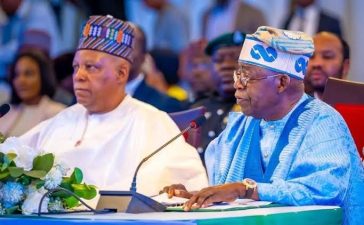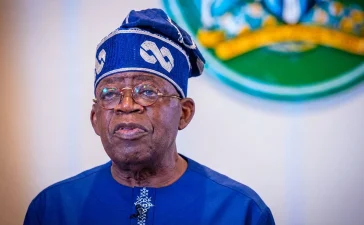In an bid to intensify efforts geared towards sensitizing Nigerians on the new Naira notes, the Central Bank of Nigeria (CBN) on Thursday continued its nationwide enlightenment campaign on the redesigned N1,000, N500, and N200 banknotes, urging Nigerians to accept and respect the currencies as national symbols.

The event which had in attendance officials of the apex bank, staff of commercial banks and other stakeholders across sectors in the economy, afforded traders the opportunity to ask questions and as well disabuse their minds about the negative conceptions they had about the redesigned currencies denominations, as well as the January 31, 2023 deadline for the return of the old naira notes.
Represented by the Branch Assistant Manager, Mr. Karim Williams, Ogbu, further promised the traders that the redesigned banknotes have enhanced security, greater durability, and attractiveness, and remained the country’s heritage.
He also reminded the businessmen and women that the old naira denominations being withdrawn from circulation would cease to be legal tender after January 31, pointing out that currency management remained a key function of the apex bank as enshrined in Section 2 (b) of the CBN Act 2007.
He said: “Indeed, the integrity of a local legal tender, the efficiency of its supply, as well as its efficacy in the conduct of monetary policy are some of the hallmarks of a great central bank.
“In recent times, however, currency management in Nigeria has faced several challenges that have continued to grow in scale and sophistication with unintended consequences for the integrity of both the CBN and the country.”
Highlighting the basic challenges of currency management in recent times, Ogbu pointed to a significant hoarding of banknotes by members of the public.
According to him, N2.72 trillion out of the N3.26 trillion currency in circulation as of June 2022, were outside the vaults of commercial banks across the country and supposedly held by members of the public.
Further highlighting the enormous benefits of the currency redesign to the economy, Ogbu said the policy would help to control inflation as the exercise would bring the hoarded currency into the banking system, thereby making monetary policy more effective.

He added: “It will also help with better design and implementation of monetary policy as we would have much more accurate data on money supply and monetary aggregates.
“We believe that this exercise would help in increasing financial inclusion, moving towards a more cashless economy, and ensuring greater formalisation of the Nigerian economy.
“The currency redesign would assist in the fight against corruption as the exercise would rein in the higher denomination used for corruption, and the movement of such funds from the banking system could be tracked easily.”
He added: “Although the global best practice is for central banks to redesign, produce and circulate new local legal tender every five–eight years, the Naira had not been redesigned in almost 19 years.”
Also, in Onitsha, the CBN urged the traders to ignore rumours that the new banknotes were not real, maintaining that the currencies are of international standard.
The Branch Controller, CBN Awka, Mr. Benedict Maduagwu, who spoke at the Onitsha Main Market, Anambra State, urged the traders to ensure that they return their old N200, N500 and N1,000 notes before the deadline.
Onitsha Main Market is reputed to be the largest market in West Africa.
Speaking on the reasons for redesigning the currencies, Maduagwu said: “This statistic shows that 84.71 per cent of currency in circulation is outside the vaults of commercial banks, with only 15.29 per cent in the central bank and commercial banks’ vaults.
“Second, is the worsening shortage of clean and fit banknotes with attendant negative perception of the CBN and increased risk to financial stability.
“Third, there is increasing ease by criminals and risk of counterfeiting, evidenced by several security reports received at the CBN.
“The benefits of the currency redesign to the Nigerian economy are enormous. This policy will help to control inflation as the exercise will bring the hoarded currency into the banking system, thereby making monetary policy more effective.”
The Chairman of the market, Mr. Innocent Ezeoha complained that despite the short duration of the deadline, commercial banks were not dispensing the new notes yet, to customers.
State Director of the National Orientation Agency (NOA), Charles Nworji, said the agency was set to move into communities to sensitise the rural dwellers about the new banknotes. He said the agency would spend two weeks on the task to ensure that traders deposit their old notes on or before the deadline.
In Ogun State, the CBN maintained that for now, there would not be over-the-counter payment of the new banknotes, unless through ATMs, until it was satisfied with the level of its circulation.
The CBN advised Nigerians that the simplest method of exchanging their old currencies for redesigned ones, was to deposit them in their accounts in banks.
The CBN Abeokuta Branch Controller, Alhaji Wahab Oseni, said this during an enlightenment campaign at Kuto Market, in Abeokuta South Local Government Area of Ogun State, which was attended by market men and women and their leadership.
Addressing the gathering, Oseni, who spoke in Yoruba for easy understanding of messages, said the redesigning of naira notes was long overdue.
He said: “Exchange of currencies over-the-counter shall not be allowed. The simplest way to do it is to deposit your cash in your account and when the banks want to pay you, they will pay you the new currency notes.
“Opening an account in banks is no longer difficult as banks are now looking for more customers to have more money to loan their customers.”
The controller advised the people to make use of the alternative means of payment like the point of sale (PoS), e-Payment, among others, to reduce the cash they would be carrying about.
Oseni commended the traders for their understanding, and urged them to report any bank that failed to comply with the CBN’s directive.
Similarly, in Kano, the apex bank also sensitised grain marketers on the redesigned naira notes. Speaking during an awareness campaign for traders on the redesigned naira notes at the Dawanau International Grains Market in Kano State, the Director of Currency Operation of the CBN, AB Umar, said the traces of intaglio ink produced by the redesigned naira notes when rubbed on plain white surfaces meant they are genuine, and not fake.
Umar, who was represented by an official at the bank, Shamsuddin Zubair Imam, debunked the insinuations that the new naira notes produced the ink mark because they are produced with low quality features.
“The new naira notes had been designed with enhanced quality features that make it difficult to be faked.
“It is untrue that if you rub the new naira notes and see the mark of the ink means the currency is fake. That ink mark is the sign of quality. It means it is genuine, not fake. That is the feature that shows a currency is genuine.
“Even American currency, if rubbed on surfaces, leaves the ink mark; that means it is genuine,” he said.
Umar also urged the traders to rush to banks and deposit their money before the January 31 deadline.
He pointed out that the redesign policy would help the apex bank reduce cost of currency management and check proliferation of fake currencies in the country.
In his remarks, the Deputy Chairman of Dawanau International Grains Market, Alhaji Baba Wawo decried the non-availability of the new currency for the traders.
According to him, traders in the market, which is the biggest grains market in West Africa, find it difficult to access the redesigned N1,000, N500 and N200 notes, even as the deadline is fast approaching.
“We call on the CBN to make the new currency available in the banks and other financial institutions. We welcome the new policy but let it be eased for us.
“We call on CBN to provide other means that will ease our transactions with our customers in rural areas. We will welcome this cashless policy even though it is a risk to us to carry huge amounts of cash to cover long distances by road.
“However, we call on the CBN to provide level ground for us to run our business with ease. The apex bank should consider that our business is cash-driven, hence, if special provision is not made, we will be at loss,” he added.







